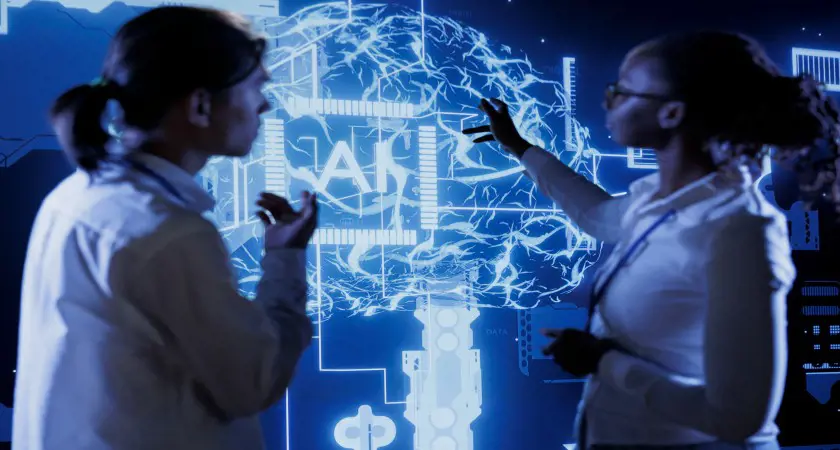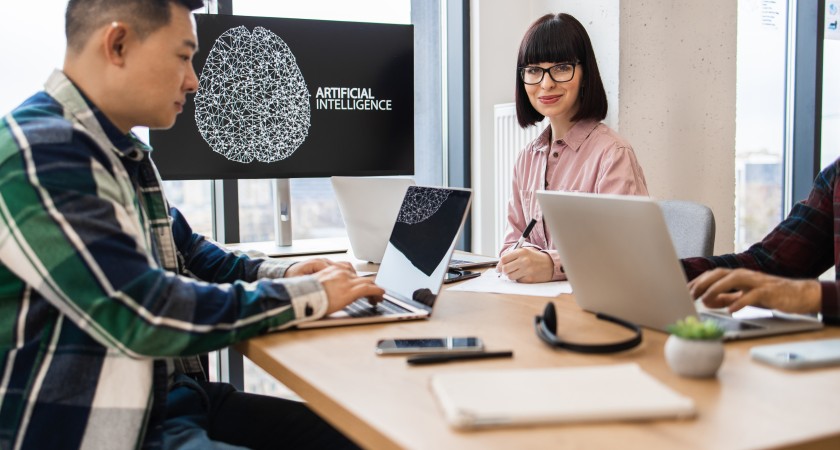 Recruitment
Recruitment

Divij Chadha
Quick Read
Summary is AI-generated, ai recruitment tools the pros and cons -reviewed

In this blog, the evolving role of AI in recruitment is examined, highlighting its potential benefits and challenges. AI tools can significantly streamline the recruitment process, saving time by analyzing large volumes of applications and conducting initial interviews. However, concerns about accuracy, algorithmic bias, and the risk of overlooking top talent are prevalent. While AI can enhance diverse hiring and provide valuable insights through video analysis, human oversight remains crucial to mitigate biases and ensure data accuracy. Organizations must balance AI capabilities with human intervention to maximize effectiveness. For tailored recruitment solutions, consider Collar Search, a leading RPO company in India.
The recruitment timeline, from sourcing to talent retention, is rapidly evolving with the advent of AI assistance. However, utilizing AI in people-oriented professions like recruitment needs to be approached with care. While AI can be a useful tool, many executives are increasingly concerned about issues of accuracy and algorithmic bias. Therefore, it is crucial to understand AI’s pros and cons. When humans are removed from the process, an AI pro can quickly become a con. Ultimately, the recruiter, CHRO, and their team remain indispensable.

Should You Use AI in Your Recruitment?
Do AI Recruiting Tools Save Time?
PRO: Time-Saving Tool for Recruiting at Scale
AI recruiting solutions can instantly analyze thousands of applications based on data, significantly reducing the effort required to identify top talent. These tools can filter candidates, schedule meetings, and even conduct first-round interviews using automated Q&A. This ability to streamline the initial stages of recruitment can save recruiters a substantial amount of time, particularly when dealing with high volumes of applicants.
CON: Waste of Time for Less-Frequent Users
Learning to use AI recruiting tools can be time-consuming. If recruitment is not a frequent activity, the effort required to navigate the learning curve may not be worth it. Occasional users may also need to refamiliarize themselves with the tools and new features each time they log on, which can take longer than manually filtering candidates.
Can AI Recruiting Tools Spot Top Talent?
PRO: Wide-Ranging Assessment
AI enables recruiters to cast a wider net for talent by scraping information on potential applicants from various networking sites like LinkedIn and other social media platforms, as well as existing online databases. This broader search capability can uncover candidates who might otherwise be overlooked.
CON: Risk of Missing Out on Top Talent
There is a risk of missing ideal candidates that a human recruiter might have identified but AI cannot. Occasional users may lack the experience to navigate around this issue, and as AI in recruitment becomes more prevalent, some applicants may try to game the system. This can lead to better-qualified applicants falling through the net while less qualified ones rise to the top.
Do AI Tools Provide Accurate Information?
PRO: AI Tools as Information Providers and Gatherers
Many AI recruiting solutions incorporate generative AI engines, such as ChatGPT, which can engage in conversations with potential hires based on prompts added to the interview model. These automated chat assistants can provide job seekers with detailed job descriptions and typical interview questions while also responding to inquiries. This interaction can provide recruiters and HR departments with a foundation for each candidate.
CON: These Tools Need Human Guidance to Ensure Accuracy
A common criticism of AI like ChatGPT is its accuracy, which should improve over time with human intervention and effective prompts. However, without proper guidance, the information provided by AI tools may be inaccurate, necessitating human oversight to ensure the accuracy of data and responses.

Do AI Recruiting Tools Support Unbiased Hiring?
PRO: AI Tools Can Help Improve Diverse Hiring
Bias, whether conscious or unconscious, often hinders organizations from recruiting the best people. Integrating AI into recruitment can help overcome human bias by focusing on qualifications, skills, and experiences relevant to the job description while removing indicators of race, gender, and class. However, ensuring proper diversity access for candidates requires well-informed and thoughtful energy from the start.
CON: AI Tools Can Also Introduce Bias
AI algorithms are programmed by individuals whose biases, if unchecked, can be incorporated into the tools. These algorithms learn from historical data that may contain inherent biases from past hiring decisions, potentially reproducing these biases over time. Understanding the capabilities and limitations of AI tools is crucial to minimize this risk.
How Do AI Recruiting Tools Use Video Content?
PRO: AI Video Tools Can Improve Interview Flexibility and Provide Valuable Data
AI vision tools can supplement talent searches by analyzing social media accounts and video content for characteristics beneficial to employers. Video-interview platforms also allow candidates to interview on their own time, with visual and audio intelligence subsequently analyzed to provide insights.
CON: Imaging Platforms Aren’t for Everyone
AI tools may discount qualified candidates for subtle, subjective differences, such as unusual speech patterns or self-consciousness, potentially causing organizations to miss out on outstanding candidates. Human intervention is necessary to ensure bias isn’t introduced into the analysis, particularly for candidates with neurodiversity or those who do not perform well on camera.

Is AI a Recruitment Friend or Foe?
AI recruitment tools have the potential to save valuable time and money while expanding the search for candidates. However, not all AI recruitment tools are created equal, and they require careful handling by trained professionals. Some tools are based on better-quality underlying data, which should be investigated before making a decision.
Before adopting AI recruiting solutions, organizations should ensure their algorithms are fair by law, conduct regular "bias audits," and make hiring methods transparent. Additionally, data security is paramount to prevent data leaks.
Ultimately, every AI recruitment solution pro comes with a caveat that human intervention can minimize. Experience, underlying data, and security are vital considerations when implementing AI in recruitment.
By carefully balancing the use of AI with human oversight, organizations can leverage AI recruiting software and tools to enhance their recruitment processes effectively.
Contact Collar Search today to learn more about how our RPO services in India can transform your hiring strategy. As a leading RPO company in India, we provide tailored solutions to meet your unique recruitment needs. Let us help you streamline your hiring process and find the best talent efficiently.











